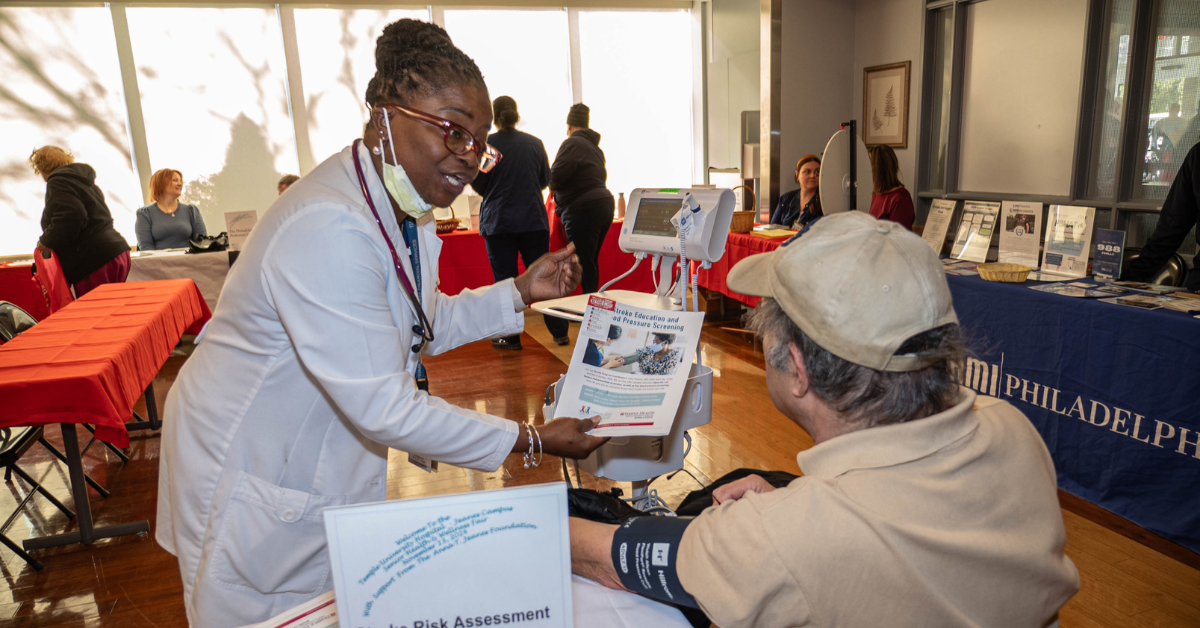New Inpatient Visitor Check-In Process Effective March 10. Learn more here.
Breadcrumb
- Home
- Fox Chase Cancer Center News
- Temple Health Outreach Makes Jeanes Senior Health and Wellness Fair a Success
Temple Health Outreach Makes Jeanes Senior Health and Wellness Fair a Success

More than 300 attended the annual Temple University Hospital – Jeanes Campus Senior Health and Wellness Fair, held Wednesday, November 13, in the main lobby of the hospital. Representatives of specialties, practices, and health outreach programs from across Temple University Health System and the local community set up informational displays throughout the lobby and answered questions or referred attendees to resources. The attending seniors took part in blood pressure, stroke, and retinal screenings, and were connected with Temple offices for follow-ups. The fair is part of the TUH-Jeanes Campus Community Classroom Program, which offers an array of community health learning offerings throughout the year, funded by the Anna T. Jeanes Foundation Board.
“We are Temple Health, but Jeanes is first and foremost a community hospital, and our community looks to us for help and guidance,” said Rosemarie Schlegel, Director of Volunteer Services at TUH-Jeanes Campus. “The goal is to make seniors aware of what is available through Temple Health and community outreach efforts.”
“I’m here to provide information and answer questions about cancer screening guidelines, risk factors, clinical trials, and treatment,” said Katerina Kotsadam, MPH, Health Educator, Office of Community Outreach and Engagement, Fox Chase Cancer Center. “My role is to educate our community to help reduce the burden of cancer and it starts with prevention.”
Kotsadam noted the culture of caring and empathy among the people she works with, adding that the sense of collaboration within Temple Health aids in her success. “The more communication we have among us, the more we can help our patients and community members, and this promotes better health outcomes.”
“Our healthy eating handout has attracted many to our table this morning,” noted Casey Dascher, MBA, RD, LDN, CDCES, Registered Dietitian and Certified Diabetes Educator, Temple University Hospital Diabetes Program. “The Food Guide Pyramid model of eating, used in years past, has given way to the more modern MyPlate approach, which is easier to follow and more effective.”
“Food is not the enemy,” she added. “As we think about our meal planning, we need to be intentional about how much, how often, and when.”
“We are sharing all the ways that Temple’s Episcopal Campus helps people,” noted Steve Marino, Certified Peer Specialist, Temple University Hospital – Episcopal Campus. “If someone is experiencing a mental health crisis, they can come to us for support. We have a wonderful food pantry at our hospital, we’re getting ready to open a new outpatient pharmacy, and we have many resources, such as art therapy and various support groups, available to our community.”
“It is very rewarding for us to work with our patients and to see their progress,” added Linda Guzman, Certified Peer Specialist and Chaplain, TUH-Episcopal Campus. “In our roles as peer specialists, we bring lived experience to our work, and we’re allowed to share our stories. This helps our patients to feel more comfortable opening up to us because they know they are not alone. Someone understands.”
According to Schlegel, the event has occurred each year for many, many years, in different forms and formats. “For me, I know it was a success from the amount of people who came and the comments we heard from them,” Schlegel said. “We shared a lot of information today, and people took advantage of the screenings offered here that they might not have had otherwise.”
Fox Chase Cancer Center (Fox Chase), which includes the Institute for Cancer Research and the American Oncologic Hospital and is a part of Temple Health, is one of the leading comprehensive cancer centers in the United States. Founded in 1904 in Philadelphia as one of the nation’s first cancer hospitals, Fox Chase was also among the first institutions to be designated a National Cancer Institute Comprehensive Cancer Center in 1974. Fox Chase is also one of just 10 members of the Alliance of Dedicated Cancer Centers. Fox Chase researchers have won the highest awards in their fields, including two Nobel Prizes. Fox Chase physicians are also routinely recognized in national rankings, and the Center’s nursing program has received the Magnet recognition for excellence six consecutive times. Today, Fox Chase conducts a broad array of nationally competitive basic, translational, and clinical research, with special programs in cancer prevention, detection, survivorship, and community outreach. It is the policy of Fox Chase Cancer Center that there shall be no exclusion from, or participation in, and no one denied the benefits of, the delivery of quality medical care on the basis of race, ethnicity, religion, sexual orientation, gender, gender identity/expression, disability, age, ancestry, color, national origin, physical ability, level of education, or source of payment.
For more information, call 888-369-2427
Share
-
Share with Facebook
-
Share with twitter
-
Share with email
-
Print this